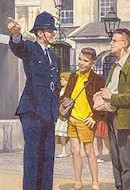|
EL BOLETIN DE INGLES
AMERICANO PREFERIDO POR LOS HISPANOPARLANTES |
|
|
OM News # 93 - Delivered
to 41041 subscribers |
|
ISSN 1668-4877 December 1, 2004 |
|
Hi, pal. We WELCOME here our new subscribers. In this issue, a
new listening section and some useful tips on the use of language. Don't
lose our December draws, special prizes and gifts which will be announced
in the portal. And, if our portal is useful for you, please
RATE US by
CLICKING HERE. See
you on December 15!!
Hola, amig@. Damos aquí la BIENVENIDA a nuestros nuevos
suscriptores. En esta entrega: Otra nueva sección de comprensión oral y
sugerencias útiles para dirigirse a la gente. No te pierdas los sorteos,
premios especiales y regalos de Diciembre que se anunciarán en el portal.
Y si te resultamos útiles,
por favor CALIFICANOS
PULSANDO AQUI.
¡¡Nos vemos el 15 de diciembre!! |
|
IN THIS ISSUE: |
|
OM Christmas
Start dancing !!
A new listening section is here |
|
Use of Language
How to address people:
Some good tips |
|
OM Lucky
Wow!! Special draws, prizes
and gifts in December !! |
|
OM Shopping
Our affordable learning tools |
|
|
|
|
 |
You see? This is Santa Claus'
turn and his smile is announcing another brand new listening section !!!
Come and enjoy our festive music for this season as you will find here
musical excerpts, bilingual lyrics and glossaries to the best Christmas
songs. Wide
listening possibilities for ESL students and teachers.
Just click
on the image and start
singing !!!
(we are sure you will be moved by some of these songs).
¿Lo ves? Le toca el turno a Santa Claus y su sonrisa está anunciando otra
flamante sección de comprensión oral. Ven a disfrutar de nuestra música
para estas fiestas porque encontrarás aquí fragmentos musicales, letras
bilingües y glosarios de las mejores canciones navideñas. Excelente
recurso de listening para estudiantes y profesores de inglés ESL. Sólo
pulsa en la imagen y comienza a cantar !!! (aseguramos que algunas
canciones van a emocionarte). |
|
 |
HOW TO ADDRESS PEOPLE. In many situations
it is possible not to use any form of address just ensuring that you use
polite forms like Excuse me..., Could/May
I....?,
Could you.....?, ... please, and
Thank you/Thanks. However, sometimes you want to address the
person directly. This interesting article will help you to get it right...
CÓMO DIRIGIRSE A LA GENTE. En
muchas situaciones puedes no utilizar ningún tipo de tratamiento siempre y
cuando emplees formas educadas como Discúlpeme...,
Podría/Puedo yo....?,
Podría usted.....?, ... por favor, y Gracias. Sin
embargo, a veces necesitas dirigirte a la persona en forma directa. Este
interesante artículo te ayudará a hacerlo como corresponde... |
|
TALKING TO PROFESSIONALS
When we are talking to
a professional while he/she does his/her job, we normally refer to their
role . So we can call a
physician doctor, or a nurse
nurse: Is it serious, doctor?
If you are talking to a policeman (or policewoman) you would normally call
him/her officer or, in the UK, constable:
Could you help me, officer, I'm lost!!
Military personnel should be referred to by their rank (e.g. captain
or sergeant, etc.): What do we do
now, captain?
If you are talking to a Christian priest you should call him (or her)
Vicar (Anglican), Father (Catholic) or
Preacher (Baptist and other Protestant denominations):
More tea, Vicar? |
|
SHOPS AND RESTAURANTS
In an exclusive or
high-class shop or restaurant a male customer should be referred to as
sir:
How can I be of assistance, sir?
In the same context, a female customer is referred to as
madam:
What would you like to drink, madam?
Be careful with this noun madam: "A madam" is a woman who
runs a
brothel . Ma'am
/ma:m/- an abbreviation of "madam"- is how we refer to the Queen
or the Queen Mother if we have the possibility of talking directly to
either of them (meaning "a lady", not "a madam", of course!! :-).
On the contrary, in America, a female customer in a shop may be called
ma'am /mem/ and everything is OK: Have a
nice day, ma'am. |
|
TALKING TO STRANGERS
If you are talking
to a male friend, a male stranger in the street or in a local shop in
England, Australia and New Zealand you can call him mate:
Got the time, please, mate! There is even
a more intimate alternative, matey, used by young people.
The American equivalent to this is buddy. Mac
and buster are less friendly American alternatives.
Mac is also common is Scotland: Is that
your brand new car, mac?
It is not very common to refer to a man as mister in Britain
and this word would only be used by a child or a teenager when addressing
an adult man whom he/she does not know: Excuse
me, mister, is there a phone box round here?
Mister is an unfriendly form of address in the States:
Listen, Mister, you'd better leave now!!
A London taxi driver may talk to his/her
male customer as
guv or guv'nor: Where to,
guv'nor?
Luv is a British slang form of love and is used to
talk to a female friend, a female stranger in the street or in a local
shop: Excuse me, luv, I think you
dropped this,
or
What can I get you, luv? A woman can
refer to a male or female stranger as luv. Men do not call
each other luv (except theatrical actors in Britain who
sometimes call each other luvvy). In America a female
stranger will often be called honey. A woman may be referred
to as lady in the USA, though surprisingly this is not very
polite :
Hey, lady, you can't park there!!
So you should call a lady madam, and should refer to a
madam as lady!!! :-)
In Scotland a woman may be referred to informally as
hen .
A telephone operator will refer to the person who has called as
caller and you should call him/her operator: Caller:
Could you put me through to extension 471, please, operator?
Operator:
Please hold the line, caller. |
|
TALKING TO A GROUP
If you are
addressing a mixed group of male and female friends you can say
folks /fauks/ or everyone:
Hi, everyone. Have I missed any good gossip?
or Hello, folks. How are things? In
the USA you could use
guys in this way. However, in Britain, when we use guys
it only refers to men. You could also refer to a group of men as
lads in an informal context. An informal
gathering of women could
be referred to as gals: Hi, gals,
what's up? A
formal gathering of people should be addressed as
Ladies and Gentlemen: Ladies and
Gentlemen, could I have your attention, please? |
|
WHEN YOU KNOW SOMEONE'S NAME
It is often difficult
to know what to call someone, even when you know them. For example, if you
meet Mr. Richard Smith in your work you might hear his
PA calling him Mr.
Smith while an older male colleague is calling him Smith.
His friends at work may call him
Richard, Dick or even Dicky.
So what do you call him? Well, you should probably start by calling him
Mr. Smith. Hopefully, he will soon say,
Please, call me Richard/Dick, and this should leave
things clear. If you are unsure, you can always say,
May I call you Richard?
Something extra could be said for a woman whose marital state you do not
know with accuracy. In that case, call her Ms.
Jennifer Whitaker. (Calling her Mrs.
Jennifer Whitaker if she is not married could be very
unfortunate for you!!).
Australians and Americans don't like to stand on ceremony and they
will quickly move on to first name terms. This is true of younger
British people as well. Typically, the Prime Minister has always
encouraged everyone to
call him Tony. And in Argentina there existed "someone" who
urged
everybody: Please, call me Carlos.
But that is another story. |
|
GLOSSARY:
role: activity (rol,
función, actividad); how can I be of assistance?
(formal) = how can I help you? (informal); brothel:
house of prostitution (burdel);
male: masculine (masculino); to drop (in
this context): allow sth. to fall by mistake (dejar caer
algo); polite: courteous, formal
(cortés); hen (literally) female chicken
(gallina); gathering: congregation, meeting,
get-together (reunión informal); what's up? = what is
happening, how are things?
(¿cómo van las cosas?); PA: personal assistant,
secretary (secretaria, asistente personal); to stand
on ceremony: be excessively formal
(ser formal en exceso); to encourage: inspire,
stimulate, incite (alentar, estimular); to urge:
to force (forzar, insistir). |
|
|
free
draws & prizes |
|
 |
December will be your SPECIAL
MONTH. Every subscriber will have his/her gift in our Christmas tree. But
MANY extra prizes and draws will also be given away!! So, don't lose the
announcements in the portal. Click on the image if you have not visited OM
LUCKY.
Diciembre será tu MES ESPECIAL. Cada suscriptor tendrá su regalo en
nuestro árbol navideño. ¡¡Pero se repartirán MUCHOS premios adicionales en
nuestros sorteos!! De modo que no te pierdas los anuncios en el portal.
Pulsa en la imagen si aún no conoces nuestra nueva sección OM LUCKY... |
|
|
|
|
¿HAS PENSADO EN CD-ROMs
REALMENTE UTILES?
Muy pronto:
Descuento Especial Fiestas de Fin de Año |
|
|
 |
APRENDE INGLES AMERICANO RAPIDA Y EFICAZMENTE |
|
CD-ROM # 1: CURSO
BASICO MULTIMEDIA
EN 20 LECCIONES
+ 3 exitosas secciones de nuestro portal (CLIC en la imagen) |
|
CD-ROM # 2: CURSO
INTERMEDIO
MULTIMEDIA EN 20 LECCIONES
+ 3 exitosas secciones de nuestro portal (CLIC en la imagen) |
|
|
next update: december 15,
2004 |
|
OM NEWS es una publicación
quincenal de distribución gratuita perteneciente al portal OM Personal
Multimedia English
www.ompersonal.com.ar. Responsable: Orlando Moure, Borges 2485, Piso
12, Dto. A, CP C1425FFI, Ciudad Autónoma de Buenos Aires, República
Argentina. |
|
| |
|
|